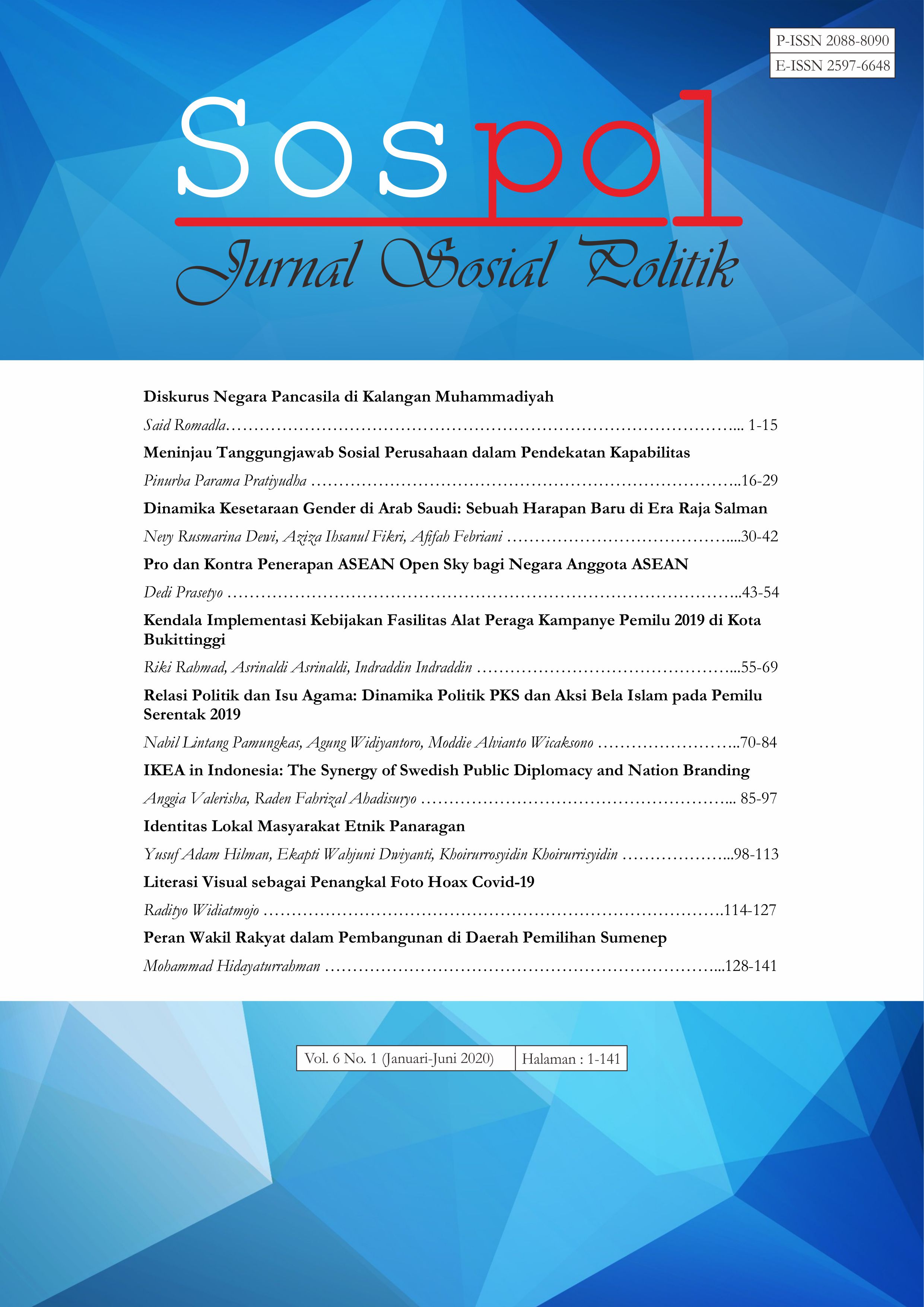Diskursus Negara Pancasila di Kalangan Muhammadiyah
DOI:
https://doi.org/10.22219/sospol.v6i1.10041Keywords:
Discourse, Hermeneutic, Muhammadiyah, Pancasila.Abstract
This study focus on the process of understanding how Muhammadiyah is interpreted as Islamic organisation and Pancasila is as the ideology. The understanding toward Pancasila as the ideology is important because the Khalifah ideology appear to replace Pancasila. Furthermore, the drawback of globalisation which bring neoliberalism issue into society weaken the principles of Pancasila. In addition, destructive cult appears to claim that their movement/ organisation apply the most the principles of pancasila. This study aims to investigate the strategies used by Muhammadiyah in implementing the five principle of pancasila ad the ideology. This study used hermeneutika Paul Ricoeur methodology which emphasis on the interpretation on distantiation between text and reader. The findings mentioned that the understanding about Pancasila is rely in al-Qur'an's Saba verse 15 "baldatun thayyibatun wa rabbun ghafur", (a good country is in Allah's forgiveness). In discourse analysis, this verse is interpreted by Muhammadiyah that Indonesia is a country which is used pancasila as the ideology. They believe that Indonesia is darul ahdi wa syahadah then this belief become cons discourse to against some movements to establish Khalifah Ideology.
Downloads
References
Al-Hamdi, R. (2013). Islam and Politics: Political Attitudes of the Elites in Muhammadiyah 1998-2010. Indonesia Journal of Islam dan Muslim Societies, Vol. 3, No. 2, December 2013: 267-290.
Arif, S. (2018). Islam, Pancasila, dan Deradikalisasi Meneguhkan Nilai Keindonesiaan. Jakarta: Elex Media Komputindo.
Azra, A. (2016). Transformasi Politik Islam Raikalisme, Khilafatisme, dan Demokrasi. Jakarta: Prenadamedia Grup.
Bleicher, J. (1980) Contemporary Hermeneutics: Hermeneutics as Method, Philosophy, and Critque. London: Routledge.
Boy, P. ZTF. (2009). Para Pembela Islam Pertarungan Konservatif dan Progresif di Tubuh Muhammadiyah. Depok: Gramata Publishing.
Bryman, A. (2008). Sosial Research Methods. Third Edition. New York: Oxford University Press.
Darmaputra, E. (1997). Pancasila, Identitas, dan Modernitas. Jakarta: PT BPK Gunung Mulia.
Fairclough, N. (1995). Media Discourse. New York: St. Martin’s Press Inc.
Fairclough, N. (2010). Critical Discourse Analysis the Critical Study of Language. Edinburgh: Logman Applied Linguistics.
Hardiman, B.F. (2015). Seni Memahami Hermeneutika dari Schleiermacher sampai Derrida. Yogyakarta: Kanisius.
Hasan, N. (2008). Laskar Jihad Islam, Militansi, dan Pencarian Identitas di Indonesia Pasca-Orde Baru. Jakarta: LP3ES-KITLV.
Intan, B.F. (2004). Public Religion and The Pancasila-Base State of Indonesia. USA: Boston College.
Jurdi, S. (2010). Muhammadiyah dalam Dinamika Politik Indonesia 1966-2006. Yogyakarta: Pustaka Pelajar.
Latif, Y. (2015). Negara Paripurna Historisitas, Rasionalitas, dan Aktualita Pancasila. Jakarta: PT Gramedia Pustaka Utama.
Littlejohn, S.W & Foss, K. (2009). Encyclopedia of Communication Theory 1. London: Sage Publications.
Lubis, A.Y. (2014). Teori dan Metodologi Ilmu Pengetahuan Sosial Budaya Kontemporer. Jakarta: Rajawali Press.
Lyytinen, K. and Hirschheim, R. (1998). Information System as Rational Discourse: an Application of Habermas Theory of Communication Action. Scand. J. Mgmt. Vol. 4. ½. Pp 19-30.
Maarif, A.S. (2017). Islam dan Pancasila sebagai Dasar Negara Studi Perdebatan dalam Konstituante. Bandung: PT Mizan Utama.
Mubarak, M.Z. (2007). Genealogi Islam Radikal di Indonesia: Gerakan, Pemikiran dan Prospek Demokrasi. Jakarta: LP3ES.
Palmer, R. E. (2005) Hermeneutika Teori Baru mengenai Interpretasi (Masnur Hery & Damanhuri Muhammad). Yogyakarta: Pustaka Pelajar.
Patton, MQ. 2002. Qualitative Research & Evaluation Methods. 3th Editon. London-New Delhi: Sage Publications.
Permata, A.N. (Mulyono, Eds). (2013). Belajar Hermeneutika Dari Konfigurasi Filosofis menuju Praksis Islamic Studies. Yogyakarta: IRCsoD.
Radford, G.P. (2005). On The Philosophy of Communication. Belmont: Wadswoth.
Raharjo, M. (2014). Dasar-dasar Hermeneutika Antara Intensionalisme & Gadamerian. Yogyakarta: Ar-Ruzz Media.
Ricoeur, P. (2006). Hermeneutika Ilmu Sosial (Muhammad Syukri). Yogyakarta: Kreasi Wacana.
Wawancara
Mu’thi, Abdul. (2018). Gedung Dakwah Pimpinan Pusat Muhammadiyah, Menteng, Jakarta Pusat, 16 November 2018.
Downloads
Published
How to Cite
Issue
Section
License
Authors who publish with this journal agree to the following terms:
- Authors retain copyright and grant the journal right of first publication with the work simultaneously licensed under a Creative Commons Attribution-ShareAlike 4.0 International License that allows others to share the work with an acknowledgement of the work's authorship and initial publication in this journal.
- Authors are able to enter into separate, additional contractual arrangements for the non-exclusive distribution of the journal's published version of the work (e.g., post it to an institutional repository or publish it in a book), with an acknowledgement of its initial publication in this journal.
- Authors are permitted and encouraged to post their work online (e.g., in institutional repositories or on their website) prior to and during the submission process, as it can lead to productive exchanges, as well as earlier and greater citation of published work (See The Effect of Open Access).

This work is licensed under a Creative Commons Attribution-ShareAlike 4.0 International License.



















